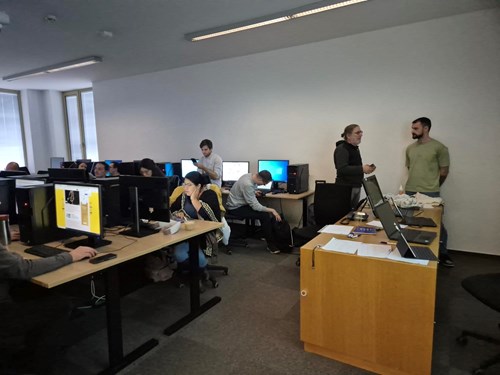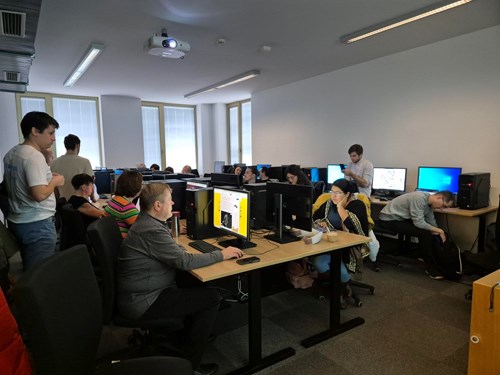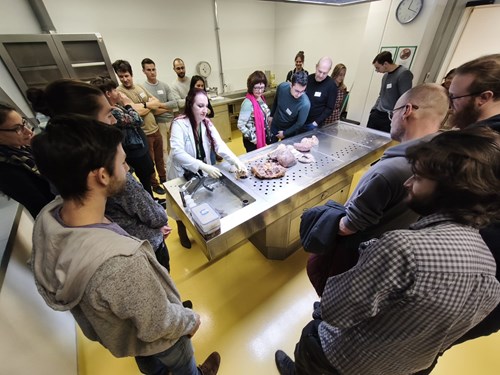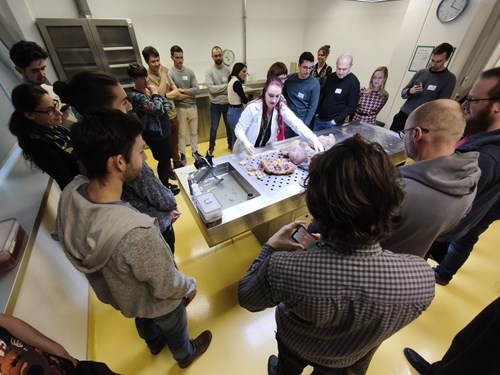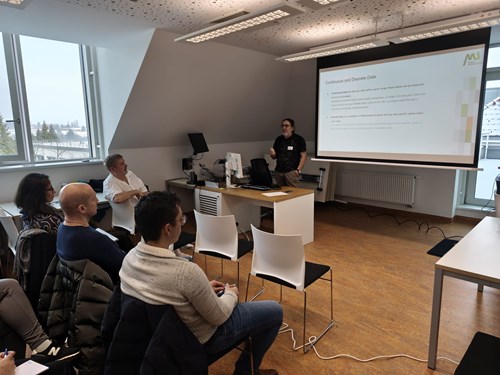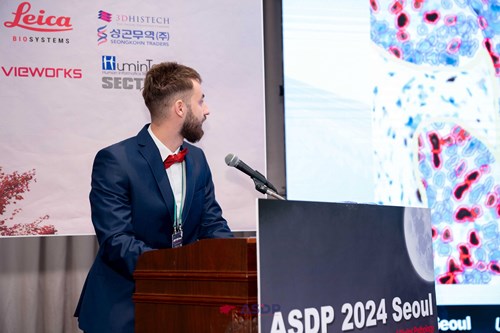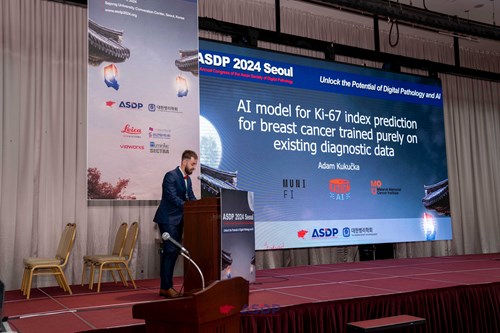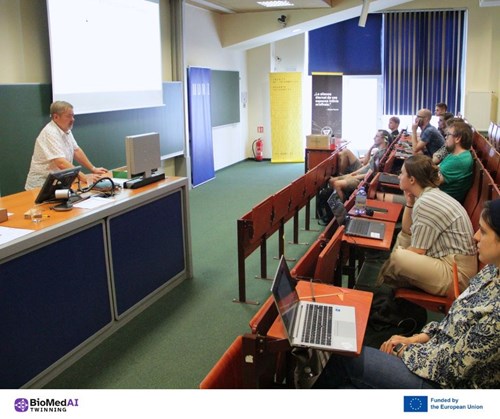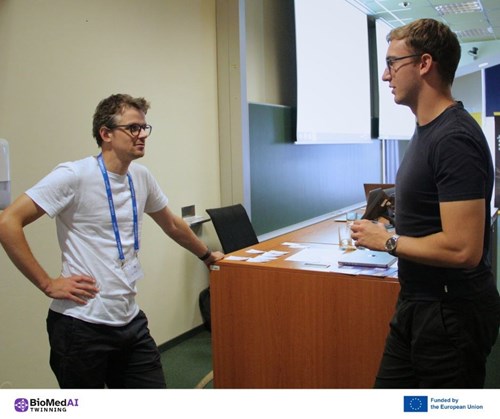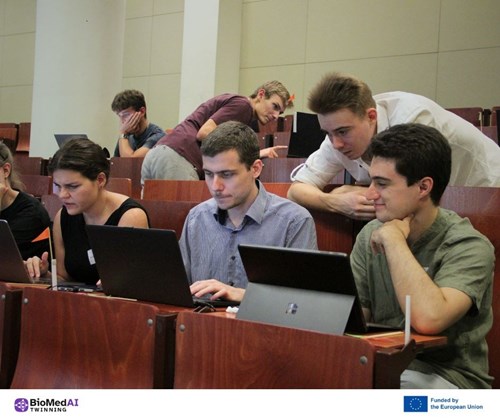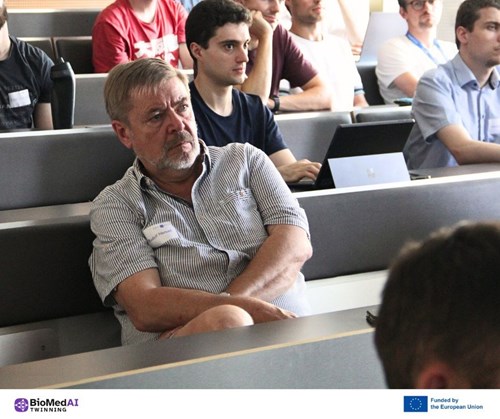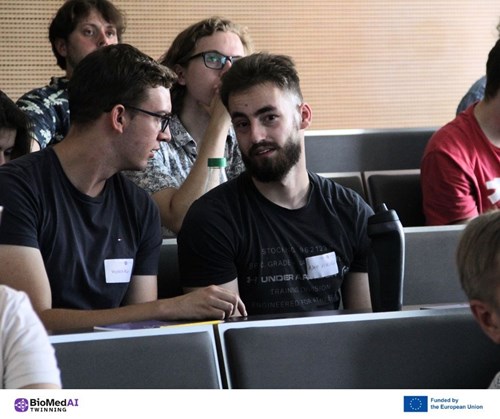News
BioMedAI Presented as Official Scientific Use Case at EOSC Symposium
BioMedAI Use Case Recognized by EOSC Federation
At the EOSC Symposium 2025 in Brussels, the BioMedAI project led by Petr Holub from Masaryk University’s Institute of Computer Science achieved a significant milestone. The team presented a multicenter validation of a prostate cancer screening model, which was officially acknowledged as a Scientific Use Case within the first wave of EOSC Federation Nodes.
BBMRI-ERIC EOSC Node: Connecting Europe’s Biobanks
Petr Holub also coordinates the BBMRI-ERIC EOSC Node, a European infrastructure that links biobanks and biomolecular resources from over 500 institutions across more than 25 countries. In an interview with the EOSC Association, he explained how this network ensures secure, FAIR data sharing compliant with GDPR, supporting the use of biological, genomic, imaging, and clinical data across Europe’s scientific community.
🎥 Interview with Petr Holub, BBMRI-ERIC EOSC Node
The EOSC Association is the legal entity that governs the European Open Science Cloud (EOSC), working to advance open science by creating a federated environment for sharing research data and services across Europe.
The EOSC Symposium 2025, held from November 3 to 5, 2025, in Brussels, is the flagship annual event organized by the EOSC Association, marking the transition of the EOSC Federation into its operational phase and showcasing its first wave of nodes.

Petr Holub Spoke at the Central European Open Source Policy Forum 2025 on Open Science and Education
The second edition of the Central European Open Source Policy Forum (CEOSPF25) took place on 31st October at the creative hub KUMST Brno, bringing together representatives from public administration, research institutions, universities, and technology companies from across Central Europe. The event focused on open technologies, digital sovereignty, and education in the open source field.
One of the key sessions was a panel discussion on education and open source, featuring Petr Holub, a researcher at the Institute of Computer Science of Masaryk University and the CIO of the BBMRI.cz research infrastructure. He emphasized that open software and open data are essential not only for research transparency but also for advancing biomedical Innovation.
The panel also explored the integration of open source approaches into university curricula, knowledge sharing between academia and practice, and opportunities for collaboration within the European Research Area.
The CEOSPF25 conference followed the success of its inaugural edition, confirming the growing importance of open technologies for building a modern and secure digital ecosystem.
📍 Central European Open Source Policy Forum 2025
🗓️ 30–31 October 2025, KUMST Brno


BioMedAI Project Concludes a Successful Three-Year Mission to Develop Reliable and Explainable AI in Biomedicine
| PRESS RELEASE |
As of October 31, 2025, the BioMedAI project marks the completion of its three-year Horizon Europe–funded mission aimed at bridging clinical practice and computational science to advance explainable and trustworthy artificial intelligence (AI) in biomedicine.
Led by Masaryk University in cooperation with the Masaryk Memorial Cancer Institute, the Medical University of Graz, and the Technical University of Berlin, the project has focused on connecting experts from IT and medicine, building secure infrastructures for sensitive data, and training new professionals in explainable AI for medical and pathological applications.
Among the project’s flagship activities were the annual XAI Summer School and XAI Winter School, which offered participants an intensive program of lectures by leading international experts, including speakers from Google Health and Charité Berlin University Medical Centre, as well as hands-on workshops on digital pathology and AI explainability.
Another key achievement is the development of the LSP-DETR model for cell segmentation in digitized pathological images. The model provides tenfold faster inference compared to existing methods. The project also became an integral part of the European research infrastructure landscape through participation in RI-SCALE (Unlocking RI Potential with Scalable AI and Data), coordinated by Masaryk University.
A recent milestone was the recognition of the BioMedAI multi-centric validation of a prostate cancer screening model as an official EOSC Federation use case, conducted on behalf of BBMRI-ERIC and the ICSC node. The use case will be demonstrated at the EOSC Symposium on November 5, 2025.
🗯️ “Our goal was to ensure that artificial intelligence in medicine is not a black box, but a tool that clinicians can trust, which requires explainability, secure data handling, and close collaboration between technical and clinical teams,”
Petr Holub
project coordinator from the Institute of Computer Science
and the Faculty of Informatics, Masaryk University.
Throughout its duration, BioMedAI has delivered significant outcomes, supporting the responsible implementation of AI in clinical practice. These outcomes include educational programs for researchers, students, and clinicians across Europe, numerous publications and international presentations, and progress toward integrating computational and data capacities for biomedical applications.
With the project’s conclusion, the BioMedAI team is now focusing on the next stage, ensuring the sustainability and long-term impact of the achieved results within the European research infrastructure ecosystem.

XAI Summer School 2025: The third edition delivers deep knowledge and hands-on experience in AI for pathology
From 1st to 5th September 2025, the Faculty of Informatics at Masaryk University in Brno hosted the third edition of the XAI Summer School, building on the success of the previous two sessions. This specialized program offered participants a hands-on introduction to the latest Explainable Artificial Intelligence (XAI) methods, focusing on practical applications and methodological innovations.
The program attracted researchers, students, and practitioners eager to deepen their understanding of trustworthy and interpretable AI. The week-long schedule combined two lectures daily with four hours of hands-on coding, while ample coffee breaks and networking time ensured a well-balanced experience. The speakers included experts from prestigious institutions, such as Google Health (David Steiner), Universitätsmedizin Berlin Charité (Norman Zerbe), Technical University Berlin (Aray Karjauv), and Medical University of Graz (Markus Plass), alongside Czech specialists from Masaryk University (Petr Holub, Tomáš Brázdil, Aleš Horák, Karel Štěpka, Vít Musil) and the Masaryk Memorial Cancer Institute (Rudolf Nenutil). Participants gained a comprehensive perspective on AI in digital pathology, covering technological, legal, and explainability challenges and data management practices.
As Kseniya Bobryshava, a participant, commented:
🗯️ "The organization was excellent – the lectures were engaging, and the hands-on sessions allowed us to go through the entire model training process. I was pleasantly surprised by the quality of the lectures. I hadn’t expected to hear from experts from places like Google Health or leading universities in Germany and Austria, alongside engaging talks from Czech specialists. With my background in biomedicine, I was particularly drawn to the technical aspects of data processing, model training, and AI in digital pathology. It’s clear that this field faces many technological, legal, and even psychological challenges, and I have great respect for the people working to overcome them."
The school demonstrated that combining lectures from top experts and practical exercises provides participants with deep knowledge of XAI in biomedical contexts and fosters interdisciplinary collaboration among computer scientists, data analysts, and clinicians. The third edition of the XAI Summer School confirms that Masaryk University, through its project BioMedAI, is a key center for AI education and development in medicine, preparing the next generation of experts and supporting innovation across disciplines.
PS: A final word from participant Kseniya Bobryshava goes to the Faculty of Informatics students who supported the hands-on sessions:
🗯️ "I want to acknowledge the students from the Faculty of Informatics who helped us with the hands-on sessions. I believe they put a tremendous amount of work into preparing the exercises, and I’m sure they learned a lot themselves in the process. It’s fantastic that Masaryk University hosts events that bring together people from different disciplines and countries, creating opportunities for both the organizers and the students."
The event was supported by the CERIT-SC infrastructure.

BioMedAI at ECDP 2025 in Barcelona: AI for the Future of Pathology
From June 25–28, 2025, the 21st European Congress on Digital Pathology (ECDP) took place at the Palau de Congressos de Barcelona in the heart of the Catalan capital. Under the theme “Unleashing the Power of Digital Pathology: Innovations, Insights, and Collaboration,” the event brought together digital pathology experts, AI researchers, image analysis specialists, clinicians, and industry leaders across Europe. Among the contributors was the BioMedAI team, showcasing its latest research at the intersection of artificial intelligence and healthcare.
Strong Research Representation from BioMedAI, Masaryk University
The BioMedAI project was proudly represented by senior researchers and students from Masaryk University (MU), Brno, Czech Republic. Senior researchers Tomáš Brázdil, Vít Musil, and Jan Obdržálek participated in the scientific program and supported the students’ presentations. Student researchers Adam Kukučka, Matěj Pekár, Jakub Pekár, and Adam Bajger presented their work through talks and poster sessions. Adam Kukučka received special recognition – his poster was selected for the Best Poster Session, allowing him to show his work in a dedicated short talk during one of the conference’s highlights.
LSP-DETR: A Novel Model for Efficient Nuclei Segmentation
One of the key contributions from BioMedAI was a talk by Matěj Pekár, who presented LSP-DETR (Local Star Polygon Detection Transformer) — an innovative model for nuclei segmentation in whole-slide histopathology images.
Developed in collaboration with Vít Musil and Tomáš Brázdil, LSP-DETR significantly reduces the need for post-processing steps. Compared to established methods such as StarDist, it offers a 10x speed-up in inference time while maintaining competitive segmentation accuracy. Its input-size-agnostic design makes it well-suited for scalable deployment in clinical settings. The code, pre-trained weights, and datasets have been made publicly available.
Fostering International Collaboration
In addition to their contributions, the BioMedAI team also met with project partners from the Medical University of Graz - Robert Harb, Markus Plass, and Charité Berlin - Aray Karjauv, who also presented their research at the conference. These interactions further strengthened the collaborative ties essential to the BioMedAI project's success.
Jiří Horák joined the delegation from the RationAI lab, which co-organized a benchmarking initiative for whole-slide image scanners. This activity plays a critical role in comparing the performance and reproducibility of different digital pathology devices.
Why ECDP Matters
The European Congress on Digital Pathology is the leading European venue for discussions at the frontier of digital pathology. In recent years, its focus has increasingly shifted toward integrating explainable and trustworthy AI into clinical workflows. This year’s conference showcased technical breakthroughs and concrete steps toward real-world implementation.
Participation by the BioMedAI team at ECDP 2025 underscores the project’s commitment to advancing explainable AI for digital pathology, contributing to algorithmic innovation and clinical impact.

BioMedAI Researcher Highlights Explainable AI Applications in Digital Pathology at EOSC National Tripartite Event
Tomáš Brázdil, researcher from the Faculty of Informatics at Masaryk University and a key contributor to the BioMedAI project, was invited to speak at the conference Research Data Day and the EOSC National Tripartite Event, held on May 21–22, 2025, in Brno under the auspices of EOSC CZ. The event brought together leading experts in open science, data infrastructures, and artificial intelligence to discuss the future of European research.
Brázdil’s invited talk, “Digital Pathology Using Artificial Intelligence in Practice,” showcased one of BioMedAI’s core objectives: translating advanced AI methods into real-world clinical environments. His presentation focused on how AI can be applied to digital pathology to analyze medical images, detect abnormalities, and support diagnostic workflows.
The participation of BioMedAI in this high-level event underscores the project’s commitment to advancing explainable AI for biomedical research and clinical practice.



Masaryk University Joins the RI-SCALE Project: A New EU-Funded Initiative Unlocking RI Potential with Scalable AI and Data
RI-SCALE marks a significant step toward the next generation of data-driven research
Masaryk University is proud to be a partner in the newly launched RI-SCALE project (Unlocking RI Potential with Scalable AI and Data), funded under the Horizon Europe program. This ambitious project brings together 29 partners across Europe to address the challenges of effective research data exploitation. Coordinated by the EGI Foundation, RI-SCALE officially started on March 1, 2025, and will run until February 2028 (36 months). The project aims to develop cutting-edge Data Exploitation Platforms (DEPs) to enhance the accessibility, usability, and impact of research data across multiple scientific domains.
Kickoff Meeting in Amsterdam
The project was officially launched during a Kickoff Meeting held at Amsterdam Science Park from March 11 to 13, 2025. This event marked the beginning of an intensive collaboration focused on co-designing and validating AI-ready platforms, integrating advanced data analytics, machine learning models, and scalable computational frameworks to fully leverage the potential of research datasets generated by European research infrastructures.
Our Role in the RI-SCALE Project
Masaryk University is a key partner in RI-SCALE, participating through the BioMedAI initiative. Experts from the Faculty of Informatics and the Institute of Computer Science will focus on advanced AI applications in medicine, computational and storage capacities scaling, and digital pathology innovations.
The principal investigator for Masaryk University is Associate Professor RNDr. Tomáš Brázdil, Ph.D., from the Faculty of Informatics. “Our goal is to strengthen collaboration with European research infrastructures, drive innovation in research data management, and advance AI integration in scientific research,” says Tomáš Brázdil from FI MUNI.
Why is RI-SCALE Important?
Efficiently exploiting large-scale research data is becoming increasingly crucial as research infrastructures generate ever-growing datasets. However, scientists often face barriers such as limited computational resources and interoperability challenges, which hinder the full utilization of these datasets. RI-SCALE is designed to overcome these obstacles through scalable AI-ready platforms, empowering researchers to conduct transformative studies in fields such as climate science, atmospheric physics, biobanking, and biomedical imaging.
Collaboration with Leading European Research Infrastructures
The DEP technology will be developed in collaboration with leading European research infrastructures, including:
- ENES (European Network for Earth System Modelling),
- EISCAT (European Incoherent Scatter Scientific Association),
- BBMRI (Biobanking and BioMolecular Resources Research Infrastructure),
- Euro-BioImaging (European Research Infrastructure for Imaging Technologies in Biological and Biomedical Sciences).
The DEP solutions will be validated through eight scientific and four technical use cases. Furthermore, RI-SCALE will collaborate with major European initiatives such as Destination Earth (DestinE) and Gaia-X, ensuring interoperability within a broader scientific and technological context.

Beyond Occlusion: The BioMedAI Research Team to Present at ISBI 2025
The paper "Beyond Occlusion: In Search for Near Real-Time Explainability of CNN-Based Prostate Cancer Classification" has been accepted for presentation at the prestigious 2025 IEEE International Symposium on Biomedical Imaging (ISBI 2025). This conference, taking place April 14–17, 2025, in Houston, TX, USA, is one of the leading events in biomedical imaging, bringing together cutting-edge advancements in medical image analysis, artificial intelligence, and computational imaging.
The authors Martin Krebs, Jan Obdržálek, Vít Musil, and Tomáš Brázdil from the BioMedAI project at the Faculty of Informatics, Masaryk University, focus on explainability in convolutional neural networks (CNNs) for prostate cancer classification in digital histopathology. Their study introduces an innovative approach that replaces traditional occlusion-based explainability methods, achieving a tenfold speedup without compromising output quality.
This acceleration significantly enhances model development and fine-tuning, bringing AI-assisted prostate cancer diagnostics closer to clinical application. At ISBI 2025, the paper will be presented by Jan Obdržálek and Martin Krebs. Congratulations to the authors on this achievement!
🔗 More about ISBI 2025: https://biomedicalimaging.org/2025/

Innovative RI-SCALE Project Secures Funding under Horizon Europe
The RI-SCALE project, set to run for 36 months, has been awarded funding under the prestigious Horizon Europe program. Titled "Unlocking RI Potential with Scalable AI and Data," the project aims to significantly advance the integration of data and artificial intelligence (AI) in scientific research. One of the project partners is Masaryk University, represented through the BioMedAI initiative, with members from both the Faculty of Informatics and the Institute of Computer Science. The principal investigator for Masaryk University is Associate Professor RNDr. Tomáš Brázdil, Ph.D., from the Faculty of Informatics.
RI-SCALE addresses the challenges posed by the rapid development of AI, the increasing size and complexity of scientific data, and the growing demands on research software, all of which play a crucial role in scientific discoveries. The project’s primary objective is to develop Data Exploitation Platforms (DEPs) that will enable scientists, RI operators, and industry stakeholders to fully harness the potential of data and AI. These platforms will host scientific datasets alongside pre-configured AI frameworks and models on high-performance computing resources. Researchers from the BioMedAI project will contribute specifically to the application of AI in medicine, the scalability of computational and storage capacities, and advancements in digital pathology.
The DEP technology will be developed in collaboration with leading research infrastructures, including ENES, EISCAT, BBMRI, and Euro-BioImaging, and validated through eight scientific and four technical use cases. Furthermore, RI-SCALE will collaborate with major European initiatives such as Destination Earth and Gaia-X to ensure interoperability within a broader scientific and technological context.

XAI Winter School 2025 Successfully Connected Brno and Graz
From January 6 to 10, 2025, the Masaryk Memorial Cancer Institute and the Faculty of Informatics at Masaryk University in Brno, in collaboration with the Medical University of Graz, hosted the Winter School focused on using Artificial Intelligence (AI) in digital pathology. Following the success of the Summer School in September 2024, this event attracted 26 participants, far exceeding the organizers' expectations and highlighting the growing importance of AI in medicine.
The first part of the program took place in Brno, where participants explored topics such as the benefits and challenges of digital pathology, the use of AI tools in diagnostics, and key principles of data management. They engaged in hands-on workshops covering work with whole-slide images, annotation creation, and the application of advanced technologies like Natural Language Processing (NLP) and Large Language Models (LLMs) to extract structured data from clinical datasets.
On Wednesday afternoon, participants traveled to Graz. There, they toured state-of-the-art digital pathology facilities, attended lectures on international certifications such as the In Vitro Diagnostic Regulation (IVDR), and participated in discussions about infrastructure management and standards in digital pathology.
The Winter School once again emphasized the importance of interdisciplinary education in advancing medical AI. Participants' strong interest and active engagement provide a solid foundation for further innovations and collaboration in this critical field.
"The aim of the winter school was to connect pathologists and computer scientists, fostering mutual understanding—pathologists could see what technology offers, and computer scientists gained insight into their needs. The hands-on experience with AI systems in real conditions was crucial. The BiomedAI project provided our institute with invaluable know-how from Graz, where they recently launched a fully digital pathology workflow," said Rudolf Nenutil from MMCI.
The event was supported by the CERIT-SC infrastructure.

Program Highlights
- Expert Lectures
Renowned specialists covered topics such as AI explainability, regulatory requirements, and the future of digital pathology. - Hands-On Experience
Workshops equipped participants with skills in preparing and analyzing pathological data, ready to be applied in their practice. - International Collaboration
The event fostered networking and collaboration between participants and experts from leading institutions in Brno and Graz.
BioMedAI representatives at the 2024 Brno Oncology Days
The 2024 Brno Oncology Days attracted a record 2,510 attendees and offered a rich program focused on innovations in oncology. The topics addressed the latest advancements, including the use of artificial intelligence (AI).
A Glimpse into the Future of Digital Pathology and Medical Data
The conference featured contributions from experts in AI applications for oncology and digital pathology. The BioMedAI representatives also contributed to the conference program with their expertise.
Tomáš Brázdil discussed the complexities of interdisciplinary collaboration in preparing data for training AI models in pathology. He highlighted the challenges of implementing these methods into clinical practice, emphasizing the importance of effective communication between physicians and computer scientists.
Petr Holub focused on leveraging European infrastructures such as BBMRI and EUCAIM to provide access to digital pathology data. His presentation also introduced explainable AI models, which can facilitate the adoption of artificial intelligence in clinical decision-making.
Aleš Horák from the Natural Language Processing Centre at Masaryk University presented methods for applying AI to the analysis of medical texts. His lecture demonstrated how AI technology aids in data classification, extraction from medical documents, automated diagnosis proposals, text summarization, and health trend predictions.
The conference again underscored its crucial role in the oncology community in the Czech Republic and internationally. Participants were left with valuable insights and inspiration for further advancements.

Winter School XAI 2025: Registration Now Open!
At the beginning of the new year, the Winter School XAI 2025 will occur from January 6 to 10, 2025, at the Masaryk Oncology Institute in Brno, the Faculty of Informatics at Masaryk University in Brno and the Medical University of Graz. This unique program will provide practical insights into the latest artificial intelligence (AI) advancements in digital pathology.
Participants will engage in training sessions led by experts, covering essential topics such as AI-assisted diagnostics, the significance of explainability in medical AI, and certification processes according to the In Vitro Diagnostic Regulation (IVDR). The program also includes a practical component, allowing participants to work directly with digital pathology data, including whole-slide images and clinical data.
The education will be conducted by prominent professionals in the field who will share valuable insights into the future of AI in pathology. Participants in this school will deepen their knowledge and skills in digital pathology, data preparation for AI, and critical aspects of privacy protection.
Registration is open until December 15, 2024. To secure your place, please fill out the registration form. Take advantage of this opportunity to expand your knowledge!

BioMedAI Team Showcases Research at the first ASDP Congress in Seoul
Representatives of the BIoMedAI project participated in the 1st Annual Congress of the Asian Society of Digital Pathology (ASDP), which took place from October 2 to 4, 2024, in Seoul, South Korea.
The delegation included Vít Musil, the team leader from the RationAI lab and Assistant professor at the Department of Computer Science, along with PhD student Adam Bajger and master's student Adam Kukučka, who presented the results of his research. This research, initially part of his bachelor’s thesis, is now under review.
The ASDP 2024 congress focused on the current status and guidelines for Asia's digital pathology (DP) and artificial intelligence (AI). It brought together experts from academia and industry to discuss how these technologies can be standardized and ethically applied to advance healthcare across the region. The program included sessions on the practical application of AI in pathology, emerging regulatory issues, and the latest innovations in digital pathology imaging. The conference provided a unique opportunity for attendees to network and exchange knowledge with global leaders in the field, further bridging the gap between research and real-world applications.
“Being allowed to attend the ASDP congress was a great honor and a life-changing experience. What impressed me most was the participants' passion for their work, making their presentations insightful and educational. Although I was nervous about presenting our project, I saw it as a valuable opportunity to learn something new and showcase part of what we’re working on at RationAI.”
Aleš Kukučka, master's student at FI MUNI
This conference was a valuable platform for connecting experts from pathology, informatics, academia, and business sectors, enabling a comprehensive view of the latest research and practical applications in digital pathology and AI.

XAI Summer School 2024 Brings Together Experts and Enthusiasts in Brno
From September 2 to 6, 2024, the Faculty of Informatics and the Institute of Computer Science at Masaryk University in Brno hosted a successful summer school focused on Explainable Artificial Intelligence (XAI) in digital pathology. Organized by members of the BioMedAI project, the event attracted nearly 40 participants eager to explore the applications of AI in medicine.
Petr Holub from Masaryk University, one of the main organizers of the summer school and Project Lead of the BioMedAI project, shared his assessment of the event: "The atmosphere was incredibly positive, with students showing great enthusiasm and actively participating in all sessions. We managed to create a collaborative environment where participants could openly share their experiences and knowledge. The summer school's greatest achievement was providing practical skills in using XAI tools in digital pathology, which is crucial for many of the attendees’ research. The hands-on workshops, where participants could apply new methods and tools to real-world data, were particularly well-received and sparked the most interest."
Throughout the week, attendees engaged in lectures and hands-on exercises led by experts in the field, including Norman Zerbe from Charité, Heimo Müller from the Medical University of Graz, Aray Karjauv from Technical University Berlin, Tomáš Brázdil, Petr Holub and Vít Musil from Masaryk University, and Rudolf Nenutil from the Masaryk Memorial Cancer Institute. An online lecture on the state of the art of XAI in digital pathology was presented by David Steiner from Google. The program covered a wide range of topics, from the basics of pathology to advanced AI research, data management, and practical training using tools like RatioPath and RatioViz.
“The hands-on exercises and lectures by leading experts provided valuable insights into the applications of AI in digital pathology, which will definitely benefit my ongoing research.”
Aleksandra Zec, PhD student from Politecnico di Milano
Aleksandra Zec, a PhD student from Politecnico di Milano who is working with digital pathology data in her research, shared her positive experience: "I had a great time in Brno, especially since I am working with digital pathology data in my PhD research. Even though I’m quite familiar with the topic, I found the sessions to be both useful and comprehensive. The hands-on exercises and lectures by leading experts provided valuable insights into the applications of AI in digital pathology, which will definitely benefit my ongoing research."
The summer school provided participants with valuable practical experience and a deep understanding of the latest technologies in XAI. The event fostered a collaborative learning environment, inspiring attendees to actively engage with the future of medical innovation and contribute to the advancement of AI in medicine.
The event was supported by the CERIT-SC infrastructure.

“The atmosphere was incredibly positive, with students showing great enthusiasm and actively participating in all sessions.”
Petr Holub from Masaryk University, one of the main organizers
Successful Start of the XAI Summer School 2024
September 4, 2024
The XAI Summer School has successfully started, with nearly 40 participants attending lectures by experts in the field. Renowned speakers are sharing valuable insights and inspiring the next generation to explore this high-potential area that promises significant advancements in medicine.
The event fosters a collaborative learning environment, motivating participants to engage deeply with the future of medical innovation.
Program
Monday
10:00-10:15 Intro (Petr Holub)
10:15-12:15 Introduction to pathology (Rudolf Nenutil)
12:15-13:15 Lunch break
13:15-15:15 Intro to XAI on (not only digital pathology) imaging (Aray Karjauv)
15:15-15:30 Break
15:30-17:00 State of the art in (X)AI in digital pathology (Dave Steiner)
Tuesday
9:00-11:00 Data in digital pathology - images, annotations, metadata, clinical data. Clinical AI applications. (Norman Zerbe)
11:00-12:00 Handling sensitive data (Petr Holub)
12:00-13:00 Lunch break
13:00-13:20 Metacentrum Registration (Vít Musil)
13:20-14:20 Handling data quality (Karel Štěpka)
14:20-14:30 Break
14:30-16:30 Mining clinical data (Aleš Horák)
Wednesday
9:00-12:00 Hands-on: Training a simple AI model in digital pathology (part 1) (Vít Musil)
12:00-13:00 Lunch break
13:00-15:30 Hands-on: Training a simple AI model in digital pathology (part 2) (Vít Musil)
15:30-16:00 Break
16:00-17:30 XAI in digital pathology (Aray Karjauv)
Thursday
9:00-10:30 Hands-on: Explainability of the trained model from Wednesday (Vít Musil)
10:30-11:00 Break
11:00-12:00 Clinical data relevant for pathology (Rudolf Nenutil)
12:00-13:00 Lunch break
13:00-16:00 Hands-on: Training AI model on Whole Slide images (part 1) (Vít Musil)
Friday
9:00-10:30 Hands-on: Model inference on WSI (Vít Musil)
10:30-12:00 Hands-on: Explainability (Vít Musil)
12:00-13:00 Lunch break
13:00-13:30 Wrap up of the school (Petr Holub)

Peter Holub is a representative of the EOSC Association Health Data Task Force
August 15, 2024
The EOSC Association Task Forces play a key role in the development of the European Open Science Cloud (EOSC). These teams, composed of experts and volunteers from across Europe, focus on specific areas essential for the implementation and advancement of EOSC.
The recent reorganisation for the 2024–2025 period has brought significant changes. Peter Holub has been appointed as the Co-Chair of the Health Data Task Force, which has been operating in its new form since July this year. He will be directly involved in addressing issues related to the interoperability and use of health data in research, in accordance with FAIR principles.
"Medical data is the subject of numerous activities aimed at standardising it (e.g., ISO, HL7, and other standardisation bodies) and making it discoverable and accessible. My goal is to find ways in which EOSC can effectively support the use of medical data in scientific research. Access to medical data is one of the essential conditions for training AI models that advance medicine and improve treatment outcomes. This is also our focus at BioMedAI, where we use AI in oncopathology."

XAI Summer School 2025
Dates: September 1- 5, 2025
Place: Faculty of Informatics, Masaryk University, Brno, Czech Republic
From September 1 to 5, 2025, the third edition of the XAI School will take place, building on the success of the previous two fully booked sessions. This specialized program offers participants a hands-on introduction to the latest advancements in Explainable Artificial Intelligence (XAI), focusing on practical applications and methodological innovations.
Due to high demand and intense interest, the XAI Summer School provides an excellent opportunity for researchers, practitioners, and students to deepen their understanding of trustworthy and interpretable AI.
🗯️ Registration information
Registration takes place via the form.
You can register until 22nd August. After that time, registration will be closed. The registered participants will receive an informative email regarding the organization and other details of the school by 26th August 2025 at the latest.
🗯️ Fees
Participation is free of charge.
Participants are expected to cover their travel and accommodation expenses.
The event is supported by the CERIT-SC infrastructure.
Read more about the previous editions of the school here:
Bridging Medicine and Technology: The BioMedAI Project Sheds Light on Cancer Diagnosis with AI
16. 4. 2024
The non-profit organization Science Party hosted an event spotlighting the collaborative efforts of pathologists and IT specialists from the BioMedAI project as they presented the challenge of cancer using AI!
Through the BioMedAI project, they demonstrated to the public how they're reshaping medicine and computer science. Their efforts in training AI to identify prostate cancer cells are speeding the diagnosis and treatment of the disease and setting a new standard in interdisciplinary collaboration.
Pathologist Rudolf Nenutil from the Masaryk Cancer Memorial Institute captivated everyone by comparing studying cells to detective work. At the same time, IT scientist Tomáš Brázdil explained the complexities of training AI to the audience.
This lecture wasn't just for specialists - it was a gathering for the wider community, showcasing the incredible strides in the fight against cancer through the power of AI.
Event: https://www.scienceparty.cz/udalost/24_02

Photo: Lucie Skřičková, Masaryk University
Rudolf Nenutil on the program BILANCE featured by Czech Television
6. 3. 2024
BILANCE is a journalistic format focusing on the analysis and evaluation of current events and topics in Czech society. The March edition of the program tackled the theme "Will We Beat Cancer?" and brought many updates from the field of cancer diagnostics and treatment.
Rudolf Nenutil, a medical oncopathologist, introduced software utilizing artificial intelligence for the recognition of cancerous findings. He collaborates with a team of computer scientists from Masaryk University on the BioMedAI project, which holds revolutionary potential in the field of cancer diagnostics.
To watch the program in the Czech language: BILANCE - Porazíme rakovinu?

Photo: MOÚ
Source: www.mou.cz
Pathologist Rudolf Nenutil featured on Czech Radio podcast: Discussion on Software Development utilizing artificial intelligence for cancer detection
7. 2. 2024
Pathologist Rudolf Nenutil recently appeared as a guest on a popular Czech Radio podcast, where he shared insights into the development of software utilizing artificial intelligence for the detection of cancerous findings. Collaborating with a team of computer scientists from Masaryk University, he contributes to the BioMedAI project, which holds revolutionary potential in the field of cancer diagnostics.
During the interview, Nenutil emphasized that traditional methods of pathological examination of tissue under a microscope have seen little advancement over the past one hundred and twenty years. However, the new software has the potential to significantly increase the efficiency and accuracy of diagnostics, enabling faster and more precise identification of tumors. The software can capture even the smallest changes that might escape the attention of pathologists.
Additionally, the podcast delves into the importance of pathologists' work, which plays a crucial role in the cancer treatment process, and the significance of the new software, which could greatly facilitate and improve the entire treatment process.
You can listen to the whole interview in the Czech language: Metoda rozpoznávání rakovinových nálezů se 120 let nezměnila. Práci pomůže zrychlit nový software | Brno (rozhlas.cz)

Author: Ludmila Opltová from The Czech Radio BRNO
Petr Holub, BioMedAI representative, contributes to discussion on FAIR data and the impact of AI on research
24.–24. 1. 2024
In late January, a discussion regarding the significance of integrating FAIR data into scientific research occurred in Milan. The event ESFRI-EOSC Policy Workshop on "FAIR Data Productivity and Advanced Digitalization" brought together representatives from European research infrastructures to delve into the future of research.
Petr Holub, representing BioMedAi and BBMRI, actively participated in this discussion and highlighted the indispensable role of artificial intelligence in medical research. Specifically, he emphasized its significance in digital pathology for cancer diagnosis and treatment and pointed out its contribution to anonymizing and synthesizing data for publication, addressing the ongoing challenge of managing sensitive data. Holub's speech underscored that the role of EOSC extends beyond mere funding; it plays a crucial part in facilitating these essential tasks.
Experts also emphasized the importance of collaboration within research communities to ensure effective implementation of FAIR data practices and discussed challenges including staff training, data accessibility, and management of sensitive data.

Photo: J. Heyrovsky Institute of Physical Chemistry
Source: https://www.jh-inst.cas.cz/cs/news/fair-data-vliv-ai-na-vyzkum-v-milane-se-diskutovalo-o-tom-proc-je-dulezite-oba-aspekty
Czech Open Source Policy Forum Highlights Contributions from BioMedAI
Brno, April 2024 – The first Czech Open Source Policy Forum 2024 brought together experts from public administration, universities, research institutions, and technology companies to discuss the role of open technologies, knowledge sharing, and cross-sector collaboration.
Discussions focused on digital sovereignty, open source in public administration, and open education. Representatives of the research community emphasized that open approaches foster transparency, independence, and faster innovation.
Among the attendees was Petr Holub, a representative from the BioMedAI project. He actively participated in discussions focused on the importance of community engagement for the sustainability of these initiatives. Holub's insights contributed to a deeper understanding of how collaborative efforts can enhance the longevity and impact of open-source projects.
The event laid the groundwork for the establishment of the Open Source Program Office (OSPO) in the Czech Republic. It became a crucial milestone for collaboration among academia, public institutions, and the technology community.



Bridging Medicine and Technology: The BioMedAI Project Sheds Light on Cancer Diagnosis with AI
16. 4. 2024
The non-profit organization Science Party hosted an event spotlighting the collaborative efforts of pathologists and IT specialists from the BioMedAI project as they presented the challenge of cancer using AI!
Through the BioMedAI project, they demonstrated to the public how they're reshaping medicine and computer science. Their efforts in training AI to identify prostate cancer cells are speeding the diagnosis and treatment of the disease and setting a new standard in interdisciplinary collaboration.
Pathologist Rudolf Nenutil from the Masaryk Cancer Memorial Institute captivated everyone by comparing studying cells to detective work. At the same time, IT scientist Tomáš Brázdil explained the complexities of training AI to the audience.
This lecture wasn't just for specialists - it was a gathering for the wider community, showcasing the incredible strides in the fight against cancer through the power of AI.
Event: https://www.scienceparty.cz/udalost/24_02

Photo: Lucie Skřičková, Masaryk University
Rudolf Nenutil on the program BILANCE featured by Czech Television
6. 3. 2024
BILANCE is a journalistic format focusing on the analysis and evaluation of current events and topics in Czech society. The March edition of the program tackled the theme "Will We Beat Cancer?" and brought many updates from the field of cancer diagnostics and treatment.
Rudolf Nenutil, a medical oncopathologist, introduced software utilizing artificial intelligence for the recognition of cancerous findings. He collaborates with a team of computer scientists from Masaryk University on the BioMedAI project, which holds revolutionary potential in the field of cancer diagnostics.
To watch the program in the Czech language: BILANCE - Porazíme rakovinu?

Photo: MOÚ
Source: www.mou.cz
Pathologist Rudolf Nenutil featured on Czech Radio podcast: Discussion on Software Development utilizing artificial intelligence for cancer detection
7. 2. 2024
Pathologist Rudolf Nenutil recently appeared as a guest on a popular Czech Radio podcast, where he shared insights into the development of software utilizing artificial intelligence for the detection of cancerous findings. Collaborating with a team of computer scientists from Masaryk University, he contributes to the BioMedAI project, which holds revolutionary potential in the field of cancer diagnostics.
During the interview, Nenutil emphasized that traditional methods of pathological examination of tissue under a microscope have seen little advancement over the past one hundred and twenty years. However, the new software has the potential to significantly increase the efficiency and accuracy of diagnostics, enabling faster and more precise identification of tumors. The software can capture even the smallest changes that might escape the attention of pathologists.
Additionally, the podcast delves into the importance of pathologists' work, which plays a crucial role in the cancer treatment process, and the significance of the new software, which could greatly facilitate and improve the entire treatment process.
You can listen to the whole interview in the Czech language: Metoda rozpoznávání rakovinových nálezů se 120 let nezměnila. Práci pomůže zrychlit nový software | Brno (rozhlas.cz)

Author: Ludmila Opltová from The Czech Radio BRNO
Petr Holub, BioMedAI representative, contributes to discussion on FAIR data and the impact of AI on research
24.–24. 1. 2024
In late January, a discussion regarding the significance of integrating FAIR data into scientific research occurred in Milan. The event ESFRI-EOSC Policy Workshop on "FAIR Data Productivity and Advanced Digitalization" brought together representatives from European research infrastructures to delve into the future of research.
Petr Holub, representing BioMedAi and BBMRI, actively participated in this discussion and highlighted the indispensable role of artificial intelligence in medical research. Specifically, he emphasized its significance in digital pathology for cancer diagnosis and treatment and pointed out its contribution to anonymizing and synthesizing data for publication, addressing the ongoing challenge of managing sensitive data. Holub's speech underscored that the role of EOSC extends beyond mere funding; it plays a crucial part in facilitating these essential tasks.
Experts also emphasized the importance of collaboration within research communities to ensure effective implementation of FAIR data practices and discussed challenges including staff training, data accessibility, and management of sensitive data.

Photo: J. Heyrovsky Institute of Physical Chemistry
Source: https://www.jh-inst.cas.cz/cs/news/fair-data-vliv-ai-na-vyzkum-v-milane-se-diskutovalo-o-tom-proc-je-dulezite-oba-aspekty
Petr Holub Explores AI's Role in Cancer Care at Brno Oncology Days
1.–3. 11. 2023 - Brno Oncology Days, Brno
IT specialist Petr Holub, the project lead of the BioMedAI project, delivered a lecture at the prestigious professional symposium, Brno Oncology Days 2023, focusing on the latest insights and practices in the field of oncology. His presentation into the utilization of advanced technologies in the diagnosis and treatment of cancer. Petr Holub concentrated on the potential of artificial intelligence and data analysis, emphasizing their significant contribution to personalized medicine and the streamlining of clinical studies.
Participants at the Brno Oncology Days symposium had a unique opportunity to hear from Petr Holub, recognized as one of the leading experts in IT applications in medicine and a key figure in the BioMedAI project. He underscored the importance of data security and protection in oncological research and practice. He also discussed the challenges posed by the integration of new technologies into existing healthcare systems and how these innovations can aid cancer patients.

Integrating AI in Biomedicine: Highlights from the Czech Pathologists' Congress
26.–28. 10. 2023
The 48th Congress of Czech Pathologists taking place in Zlín, Czech Republic, featured a compelling showcase of the intersection between medical expertise and information technology, with a focus on the BioMedAI project. Key speakers IT specialist Tomáš Brázdil from Masaryk University and pathologist Rudolf Nenutil from Masaryk Memorial Cancer Institute collaborated to apply machine learning to pathology, aiming to enhance diagnostic accuracy through AI systems assisting pathologists in their work. Brázdil emphasized the significance of problem formulation, meticulous data preparation, and rigorous testing supervised by pathologists to ensure the effectiveness of AI systems in clinical practice. He provided a comprehensive overview of the entire process, emphasizing the need for collaboration between IT specialists and medical professionals. Nenutil's exploration of how neural networks can identify suspicious areas in prostate biopsies showcased the alignment of AI diagnostic features with traditional pathology techniques. He discussed the strengths and limitations of neural networks in pathology, advocating for ongoing research and development.
The presentations underscored the transformative potential of machine learning in enhancing medical diagnostics, positioning the BioMedAI project as a significant stride toward integrating AI in clinical settings. The congress highlighted the importance of a multidisciplinary approach for advancing contemporary medicine. The discussions and insights from Brázdil and Nenutil not only showcased progress in biomedicine but also emphasized the collaborative spirit driving innovation in healthcare.

Project BioMedAI at the event AI 4 All: The Key to the Future
14. 10. at the Jiří Mahen Library, Brno
The AI 4 All event, held in Brno, Czech Republic, on October 14, 2023, in collaboration with the Jiří Mahen Library, engaged a diverse audience across age groups to explore the world of artificial intelligence. The program featured various lectures and workshops for adults, children, and students, providing practical demonstrations of AI applications in different fields, interactive quizzes, and creative workshops for the youngest participants. IT specalist Tomáš Brázdil from the Faculty of Informatics at Masaryk University contributed with a lecture on digital pathology, introducing an innovative assistance system based on machine learning with the potential to revolutionize diagnostic processes in medicine.
During his presentation, he emphasized his active participants on the BioMedAI project, which focuses on advanced artificial intelligence technologies for developing the new cancer treatment methods. His discourse underscored how AI can contribute to more precise and efficient diagnostics. The AI 4 All event provided an inspiring platform for experts and the public to meet, deepening awareness of the importance of AI in both current and future societies.

Scientist Tomáš Brázdil unlocks AI secrets at event AI 4 Talents
13. 10. at VIDA! Science Centre, Brno
As part of the AI 4 Talents event in the VIDA! Science Centre, Brno, Czech Republic, which attracted enthusiastic high school students and their educators, IT specalist Tomáš Brázdil from the Department of Machine Learning and Data Processing at the Faculty of Informatics, Masaryk University, made a significant presentation. His lecture titled "Neural Networks and Image Recognition: A Historical Journey with Surprises" provided attendees with a captivating insight into the development of neural networks and their applications, generating considerable interest among young talents.
Brázdil also shared information about the BioMedAI project, which is an example of applying artificial intelligence in medicine. Within this project, advanced AI technologies are utilized to develop new methods for cancer treatment, representing significant potential for improving healthcare and offering new hope for patients. His contribution thus demonstrated how artificial intelligence can positively impact not only the technological realm but also make a substantial contribution to the fields of biomedicine and healthcare.

Petr Holub presented BioMedAI's role in advancing explainable AI in medicine at BioTechX Europe 2023
4.–6. 10. 2023
At the BioTechX Europe conference, Petr Holub from BioMedAI took the stage to present groundbreaking advancements in the application of explainable artificial intelligence in medicine.
Holub's presentation at BioTechX Europe focused on the use of explainable AI in medicine, particularly in diagnosing prostate cancer. He emphasized how explaining AI models can boost their credibility in healthcare. Additionally, he highlighted BBMRI's vital role in providing samples and expertise, showcasing its significance in advancing explainable AI. The presentation showcased the potential of explainable AI in medical diagnosis and BioMedAI's dedication to healthcare innovation.
BioTechX Europe congress
Europe's largest congress focused on diagnostics, precision medicine, and digital transformation in pharmaceutical development and healthcare, gathering 3000 leaders, 400 speakers, and 100 start-ups. The last annual event was held in Basel in early October 2023.

BioMedAI Workshop Graz
17.–19. 7. 2023
The July workshop focused on tissue sample preparation, scanning, and analysis. The networking workshop provided an overview of research topics, methods, and approaches to how different groups work and interact with medical environments. The participants also discussed the future of the project, e.g., educational events and summer schools within the BioMedAI project.
The event was attended by IT specialists from Masaryk University RationAI, Medical University Graz, and pathologists from Masaryk Memorial Cancer Institute.

BioMedAI Project Takes Centre Stage on Czech TV's 'About Science and Scientists'
24. 6. 2023
In the Czech Television program "About Science and Scientists", aired on June 24, 2023, the spotlight was on the BioMedAI project. This pioneering project strives to harness the power of advanced artificial intelligence and machine learning methods within biomedical research and oncology. The show offered viewers an inside look at the collaborative efforts of scientists and IT specialists working together to develop algorithms that can analyze complex medical data and contribute to improved diagnostics and personalized cancer treatment.
The broadcast featured various aspects of the BioMedAI project, including its advantages for clinical practice and its potential impact on patients. The discussion highlighted the critical role of interdisciplinary cooperation between medicine and information technology, showcasing how cutting-edge technologies are forging new pathways in the battle against cancer. The program also paid close attention to the ethical considerations surrounding personal data and the confidentiality of information, underscoring their significance in this domain.
To watch the program in the Czech language: O vědě a vědcích: Umělá inteligence v onkologii

Workshop on Introducing AI Groups
30.–31. 3. 2023
This workshop was a continuation of the XAI workshop earlier in the same week, which allowed individual AI groups contributing to the project to introduce to each other. This included groups from Masaryk university - RationAI, CBIA, VisitLab, NLPlab, and a group of prof. Novacek, a Group of dr. Müller from Medical University Graz, and DAIlabor from the Technical University Berlin. The networking workshop provided an overview of research topics, methods how different groups work and interact with the medical environments, and how the whole team can collaborate on preparation of educational events within the BioMedAI project.

Workshop in Explainable AI Models
27.–29. 3. 2023
Explainability of AI models is helpful to support adoption of AI tools in medical environments and also means for AI developers to understand their models and steer their developments. The workshop focused on concepts of explainability and how explainability is applied to AI in digital pathology. The workshop participants prepared an extensive literature survey to provide a basis for the subsequent discussions. The main workshop topics included:
- concepts of explainability and their use in AI models
- explainability by design vs. post hoc explainability methods
- explainability specifically in image analyses
- certification of AI models in medicine and use of explainability for certification purposes

Workshop on Infrastructures for Application of AI on Sensitive Data
8.–10. 3. 2023
Processing imaging data in whole slide images (WSI) is a major challenge for IA researchers - finding capacities to store and process the WSI while complying with the security requirements by the data sources. This workshop focused on getting an overview of SensitiveCloud service by CERIT-SC and how to use it not only for local processing at Masaryk University, but also by researchers at Medical University Graz and Technical University Berlin. The main topics included:
- porting AI application to Kubernetes
- running long-term services in SensitiveCloud
- scaling up computations in SensitiveCloud
- effective transfers of data from Graz to Brno
- onboarding users from MMCI, MUG, and TUB

Data Management Workshop
1.–3. 2. 2023
Management of large volumes of imaging, associated phenotypical/clinical and other data is becoming a challenge for health care institutions. We have organized a first in the series of workshops within the BioMedAI, focusing on bringing together experts on medical data management from Medical University Graz and Masaryk Memorial Cancer Institute with experts from Institute of Computer Science at Masaryk University focusing on building storage and data processing capacities as a part of national eInfrastructures.
The workshop allowed introducing medical partners of the project and dealt with the following topics:
- what should be data formats for long-term storage of whole slide images?
- what are the existing data flows and what should be a data flows in AI-assisted environments from pathologist perspective?
- what are the state-of-the-art infrastructures for storing and processing sensitive data?
The partners introduced their existing solutions and gaps have been identified and discussed.


















